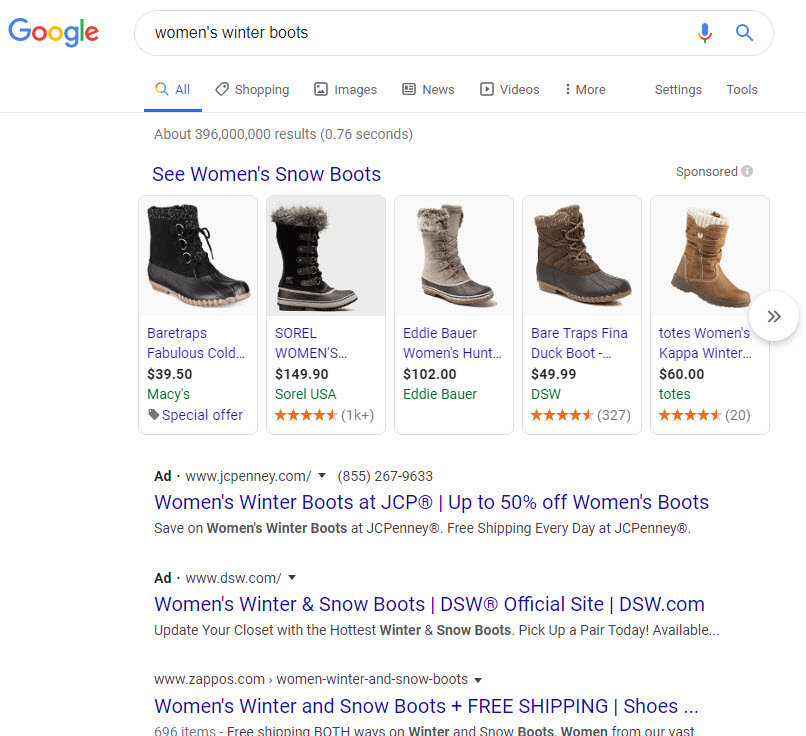
Weekly Breakdown – 1.31.20
Weekly Digital Breakdown
Jan 31
Google Redesign a Work in Progress
As privacy regulations ramp up, Google is at the forefront, trying to help advertisers continue to reach consumers via paid marketing. In January, the company began experimenting with a redesign of paid search but the changes were quickly met with criticism. The new format makes differentiating paid ads from organic results less obvious to users, likely driving up clicks for paid results inadvertently, inflating metrics for advertisers and confusing users.
In response, Google has acknowledged audiences may not notice the word “ad” or a favicon as they appear in the new paid search ad format. The company will continue experimenting with placement and identification of paid ads as Google works to refine the process and update paid search results.
While Google is always looking to improve the customer experience, the changes may come as a result of Google feeling the heat from the competition, particularly Amazon, as their market share percentage has plateaued. Amazon Advertising has slowly been closing the gap on paid search and is projected to continue.. The updates also follow Googles’ recent announcement that they intend to discontinue use of third party cookies in Chrome by 2022. It’s likely the company is working diligently to navigate how to meet users as digital continues to evolve with unexpected changes.
https://www.marketingdive.com/news/google-reconsiders-paid-search-redesign-amid-criticism/571110/
Facebook Discloses Lawsuit Settlement
Facebook has experienced a range of emotions this week when it comes to their fourth quarter earnings report. While the company reported a record $20.7 billion in Q4 revenue, the announcement also came a disclosure of a $550 million class-action lawsuit settlement as a result of unauthorized use of biometric data.
The lawsuit claims Facebook’s Tag Suggestions tool, which uses face recognition software to match new photos with others a person is tagged in to make tagging suggestions, was used as a default setting and violated the 2008 Illinois Biometric Information Privacy Act. The act prohibits the collection of biometric data without user permission. Illinois is currently the only state with biometric privacy regulations.
Despite paying the fine, Facebook declined to admit wrongdoing, but agreed to ask users’ permission before collecting facial data in the future. There was also no mention of how historical data would be stored or used moving forward. With so few regulations in place for facial recognition, the case could set a precedent for others in the tech industry.
Kids Advertising Is All Fun and Games
This week, privacy-focused kids tech company, SuperAwesome, announced $17 million raised in the latest financing round. In a time when many companies are struggling to adapt to new regulations, especially those trying to reach younger audiences, SuperAwesome is laying the groundwork for success. The investment was particularly notable as it was led by M12, Microsoft’s venture fund which also owns the popular kids game, Minecraft.
Since 2013, the company has worked to help advertisers deliver ads that are compliant with both the U.S. Children’s Online Privacy Protection Act and Europe’s General Data Protection Regulation on children’s websites and apps. SuperAwesome has created a way to tap into a coveted market and do so securely and within legal guidelines, which can often be a struggle for brands.
Ads are able to be served based on analysis of the content within an app or site and then matched to an appropriate and compliant ad. Unlike other ad serving platforms, SuperAwesome does not rely on third-party cookies for ad targeting.
SuperAwesome has been able to assist high-profile brands such as Mattel and Lego extend their digital marketing reach and increase engagement for younger audiences. With brands lacking options on platforms such as YouTube when it comes to advertising on kids’ content, the company’s growing popularity lends to its credibility. The kids space has largely been overlooked, but SuperAwesome is ready to change the game.
https://digiday.com/media/ad-tech-isnt-dying-children-focused-ad-platform-superawesome-raises-17m/






